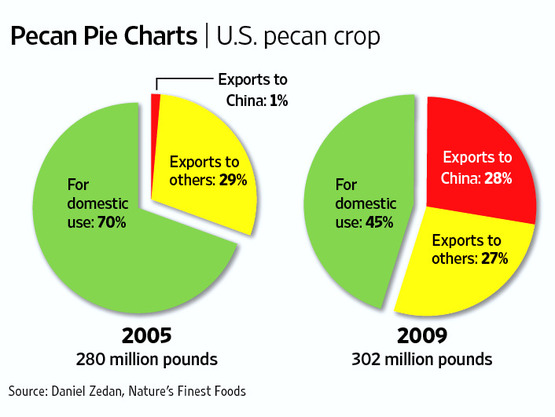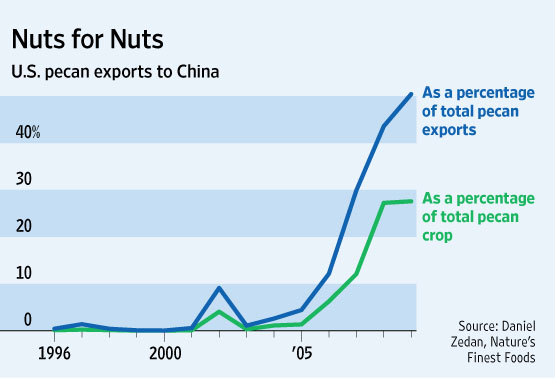WSJ: "The Chinese want our nuts." Roast 'em if you got 'em!
 Tuesday, April 19, 2011 at 8:13AM
Tuesday, April 19, 2011 at 8:13AM 
Sometimes China feels like a nut (2009), sometimes it doesn't (2005). But when it does and that nut is the pecan, then an entire US industry changes - overnight.
Pecans are very American, the WSJ piece begins, as the pecan is the state nut of Arkansas, Alabama and Texas. Since forever, the price of pecans has followed the usual ag pattern of boom-and-bust. That all changed a few years back when the Chinese and their burgeoning middle class entered the picture.
Why do the Chinese get so turned on to pecans? Advertising. Retired Chinese woman: "We used to eat only walnuts, and then we saw on TV that pecans are more nutritious than walnuts."
And an industry is reshaped.

The underlying dynamic that will increasingly knit the two nations together:
Nearly $1 of every $5 China spent on U.S. items last year went to buy food of some sort, $16.6 billion worth, according to the U.S. Department of Commerce. U.S. exports of goods of all sorts to China more than doubled between 2005 and 2010. Exports of crops and processed foods—soybeans, dairy, rice, fruit juice—more than tripled. Exports of pecans rose more than 20-fold.
Naturally, fears arose in the industry - or at least among its middlemen. Check this out:
American shellers complained that selling so many premium pecans to China—the Chinese want the biggest, best nuts—would undermine both the domestic market and export markets in Europe. So they held back orders. China responded by going directly to growers. As Texas A&M pecan expert Jose Pena puts it: "It's kind of hard to tell a grower not to sell to the highest bidder."
There is a larger lesson in there: US could use a new partner but prefers the seemingly safe "known known" of Europe. Then China comes along and upsets the dynamics, but still the industry's insiders say, we must stick with what we know. China goes directly to suppliers, and this is a bit threatening, but who can argue with sales?
Same is true for a lot of what America seeks to do in the Gap/developing world. We assume our only allies are our old allies. China shows up and creates all this positive change, but we find it upsetting and have a hard time interacting with them on the subject, preferring our known knowns from Europe. But the path ahead is clear enough: the market has shifted and we've got some new friends - if we choose to get past the fear and recognize them as such.
This has been my underlying logic going back to "Blueprint for Action" (2005, but started briefing in late 2003). "Implausible!" and even "impossible" in the pol-mil realm, because we prefer the enemy image (AirSea Battle Concept), but the solution for our having too few resources to throw against too many fake states undergoing remapping in the Gap is clear enough: you ally yourself with the great demand producer in the system right now.










Reader Comments (3)
I've spent most of my adult life in the southern U.S. Over the years I've sadly noted the hundreds and hundreds of abandoned Pecan groves along beautiful backroads and by-ways. Wouldn't it be wonderful for some of these struggling little towns to find new life as a result of "those damn Chinamen that take all our 'good jobs'! " Talk about a wonderful, attitude altering, game changing opportunity (one of a great many, as you point out). Great article thanks for bringing forward.
Americas fear continues, and does not seem to be disappearing anytime soon. I read articles like this one, and I am reminded of the anti-Irish practices of old. (And that is just one example of many.)
Why wouldn't you want to take China's money? Seems like someone somewhere could use the business--especially after reading Phil's comment.
There is one and only one non-crazy reason to have this anti-chinese attitude that I can see and that is that having this much of the product going to one market creates a level of market power that is easy to trip up over. Look at the case of Vlassic pickles and Walmart for a real world example. They (Vlassic) let themselves be dominated by a single partner and it really hurt them. Ultimately it's no excuse but such negotiating leverage *does* need to be managed by product channel diversification. The pecan people need to find new markets so no one purchaser dominates too much.